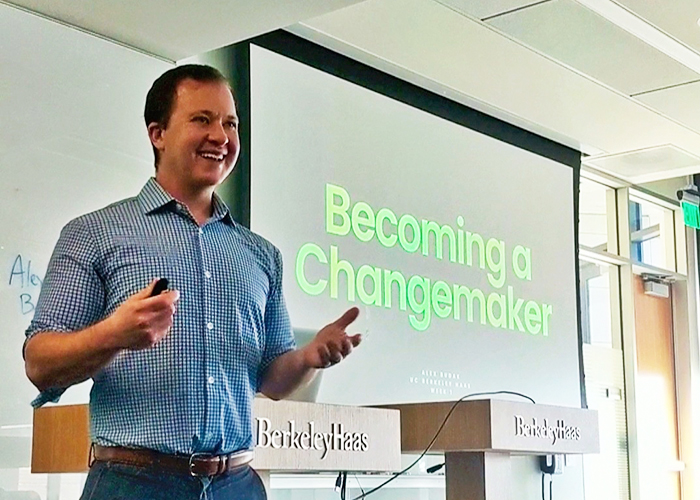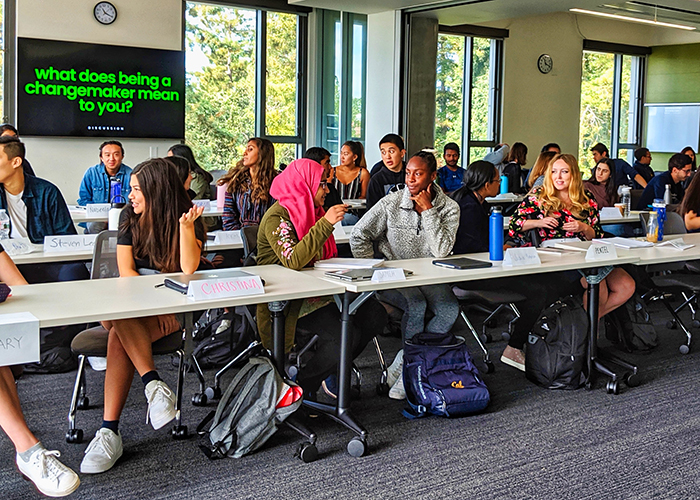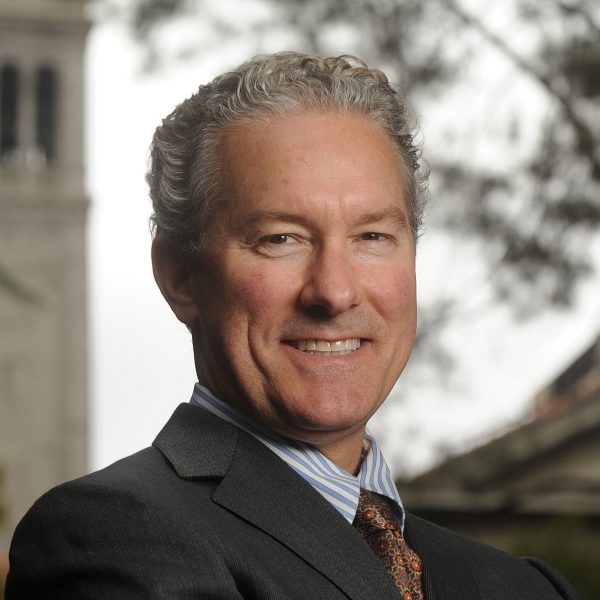‘Berkeley Changemaker’ course turns self-discovery into tool for change

The instructors of a new UC Berkeley course have set an ambitious goal: changing the world, one student at a time.
“The Berkeley Changemaker: A Discovery Experience” is a three-week class offered this summer to first-year undergraduates to help them identify their passions and leverage their leadership traits to transform Berkeley and the world, for the better.
Centered on students’ self-discovery, the course will use selected readings, video panels, reflective writing exercises and conversations with people outside of class to explore age-old questions such as: What is your purpose? What does it mean to have grit? How do you take risks and still learn from failure?
“Students will be creating their own identity as leaders, while they first transition to Berkeley,” said Berkeley Haas lecturer Alex Budak, who will teach the course beginning July 27. “We want students to see themselves as changemakers who are resilient, creative, collaborative and optimistic. … Leaders ready and able to impact the future in a positive way.”
Offered through Berkeley’s College of Letters and Science, the class is part of a campuswide initiativeled by faculty and administrators, and coordinated by Rich Lyons, Berkeley’s chief innovation and entrepreneurship officer, to inspire students to think beyond themselves.
Lyons said the course is key to building that foundation for new students early on and is an example of Berkeley’s long legacy of cultivating innovative leaders who challenge the status quo. Examples of such leaders are the student activists who, in the mid-1960s, made Berkeley the home of the Free Speech Movement, and the Berkeley scholars and entrepreneurs behind revolutionary companies like Apple Inc. and Tesla Motors.
“Putting changemakers out into the world has been a part of Berkeley’s DNA forever, and for incoming students, this is why they came to Berkeley,” said Lyons, who will be a contributing instructor in the class. “Through this course, we want students to shift away from thinking about our impact as individuals. … Your biggest impact will come through, and with, other people. We’re going to challenge students to understand that more deeply.”
Making a changemaker
As a social entrepreneur, Budak said he initially conceived the course out of his experiences working with changemakers and entrepreneurs around the world who were unsure how to enact positive change.
“There was this deep humility that came from saying, ‘I don’t know exactly what the world needs, but I do know that the world needs more changemakers,’” said Budak. “The world needs more people who have those leadership skills, that mindset and that desire to make a positive difference, to lead positive change.”
“That’s kind of been the thread that connected my whole career, to find and cultivate those changemakers,” he added. “It’s really what drives me.”
In spring 2018, Budak began teaching what would be the first iteration of his changemaker course for Berkeley’s Haas business students and entrepreneurs. Though somewhat similar, Budak’s new summer course has evolved to serve first-year students from all academic disciplines.
“The humanists can see themselves in this course just as much as the STEM students, and just as much as the social scientists,” said Lyons. “So, that idea that we’re all in this together, despite our different areas of expertise, we hope, is a vehicle for helping to unify us.”
As students begin to develop their own unique leadership traits, coordinating instructor Laura Hassner said the course will emphasize the importance of critical thinking, collaboration and communication, while also promoting a sense of community.
Through video-recorded, fireside-style chats, students will learn from 15 award-winning Berkeley faculty from 16 academic departments, including special guest Chancellor Carol Christ and economics professor Janet Yellen, former chair of the Federal Reserve, what it means to be a changemaker in their different career fields.
“So, even if a student comes to Berkeley and knows exactly what they want to study, or if they want further time to explore what Berkeley has to offer,” said Hassner, “this class will benefit them at whatever stage they are in that process.”
While the two-unit class consists of 15 sessions with designated deadlines for each week, all course materials are available online for students to access and complete, whenever their schedules allow them.
Moreover, the course is free for all incoming Freshmen who pass it. Students will also receive a free Berkeley unit to use in summer 2021. Hassner said enrollment in the class will be close to 500 students.
‘Embracing the unknown’

Third-year student Brittany Sartor took Budak’s initial Haas changemaker class last fall and said first-year students should see the new course as an opportunity to envision their true potential as leaders.
Sartor, a self-proclaimed introvert, said that, prior to Budak’s course, she had always been terrified to talk or chime in during her classes. She said Budak helped push her out of her comfort zone through interactive activities and discussions.
One assignment she remembers was having to walk around campus asking strangers to borrow a hat, or sing a Beatles song on the spot. It was an exercise in experiencing rejection that she said helped her feel more comfortable asking people for help.
“I grew not only as a leader, but as a person,” said Sartor, who wants to start her own company that creates plant-based alternatives to meat. “I’m more willing to go after the things that I’m passionate about and to make the changes in myself that I personally can make.”
Alyssa Zhou took the course and said that Budak’s positive energy and ability to inspire his students made her feel comfortable with “embracing the unknown.”
Zhou, who admits she is a stickler for preparation, said that after she graduates next year, she wants to work as a health care worker in a developing country and is excited for that journey, wherever it may take her.
“Alex re-framed failure as a positive thing, and asked us to ‘fail forward,’” said Zhou. “Failure is inevitable, so I was able to realize that it’s just all about putting your best foot forward and moving on from your mistakes.”
A world in pivot
Lyons said Budak’s new changemaker course could become an onboarding experience for all newly admitted students that can lead to other “changemaker” connector courses, or even a credential through an all-encompassing “Change-school.”

In the midst of a global pandemic, Lyons said, developing great leadership is essential for people to be able to move forward, together.
“The world is pivoting right now, and we don’t know how long this is going to last,” Lyons said. “But it’s especially important, in these kinds of moments, to still look up at the horizon from time to time. Let’s continue to think big, because this course, and those that proceed it, have the potential to change the lives of a lot of students.”
Budak added that, amidst pushes for current societal change, as protests against systemic racism and police violence continue around the world, “it is a privilege to be teaching this course at this moral moment.”
“We have an ethical imperative to be both anti-racist and action-oriented,” he said. “And I believe that both the substantive lessons of the course, as well as its quintessential Berkeley values, will help our students become the changemakers our communities, and our country, need right now.”
